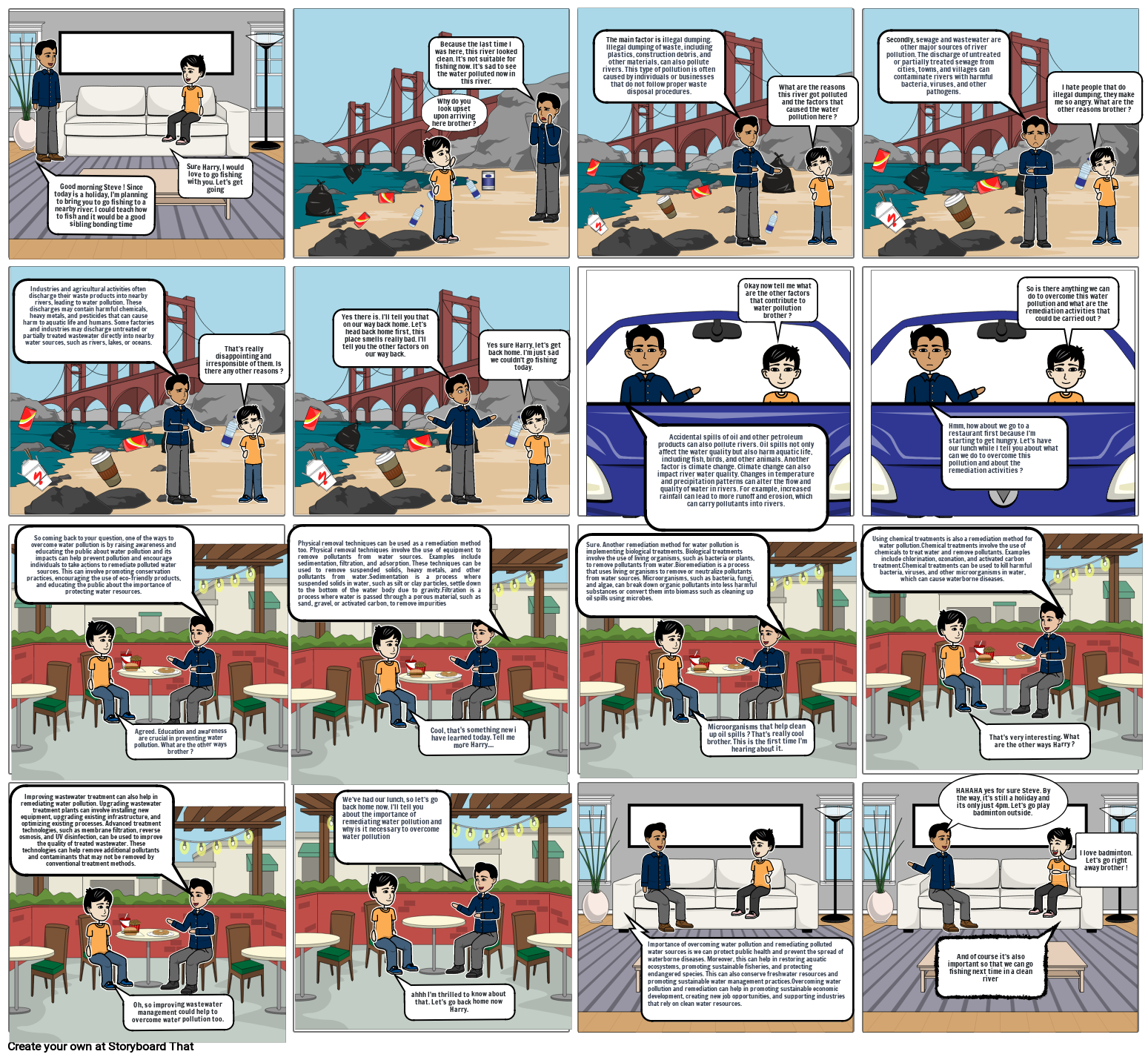WATER POLLUTION

Storyboard Tekst
- Good morning Steve ! Since today is a holiday, I'm planning to bring you to go fishing to a nearby river. I could teach how to fish and it would be a good sibling bonding time
- Sure Harry, I would love to go fishing with you. Let's get going
- why do you look upset upon arriving here brother ?
- because the last time I was here, this river looked clean. It's not suitable for fishing now. It's sad to see the water polluted now in this river.
- The main factor is illegal dumping. Illegal dumping of waste, including plastics, construction debris, and other materials, can also pollute rivers. This type of pollution is often caused by individuals or businesses that do not follow proper waste disposal procedures.
- What are the reasons this river got polluted and the factors that caused the water pollution here ?
- Secondly, sewage and wastewater are other major sources of river pollution. The discharge of untreated or partially treated sewage from cities, towns, and villages can contaminate rivers with harmful bacteria, viruses, and other pathogens.
- What are the reasons this river got polluted and the factors that caused the water pollution here ?
- Industries and agricultural activities often discharge their waste products into nearby rivers, leading to water pollution. These discharges may contain harmful chemicals, heavy metals, and pesticides that can cause harm to aquatic life and humans.
- What are the reasons this river got polluted and the factors that caused the water pollution here ?
- Yes there is. I'll tell you that on our way back home. Let's head back home first, this place smells really bad. I'll tell you the other factors on our way back.
- Oh damn, that is really bad. Is there anymore factors that contribute to this water pollution ?
- Accidental spills of oil and other petroleum products can also pollute rivers. Oil spills not only affect the water quality but also harm aquatic life, including fish, birds, and other animals. Another factor is climate change. Climate change can also impact river water quality. Changes in temperature and precipitation patterns can alter the flow and quality of water in rivers. For example, increased rainfall can lead to more runoff and erosion, which can carry pollutants into rivers.
- Okay now tell me what are the other factors that contribute to water pollution brother ?
- Hmm, how about we go to a restaurant first because I'm starting to get hungry. Let's have our lunch while I tell you about what can we do to overcome this pollution and about the remediation activities ?
- So is there anything we can do to overcome this water pollution and what are the remediation activities that could be carried out ?
- Improving wastewater treatment can also help in remediating water pollution. Upgrading wastewater treatment plants can involve installing new equipment, upgrading existing infrastructure, and optimizing existing processes. Advanced treatment technologies, such as membrane filtration, reverse osmosis, and UV disinfection, can be used to improve the quality of treated wastewater. These technologies can help remove additional pollutants and contaminants that may not be removed by conventional treatment methods.
- So coming back to your question, one of the ways to overcome water pollution is by raising awareness and educating the public about water pollution and its impacts can help prevent pollution and encourage individuals to take actions to remediate polluted water sources. This can involve promoting conservation practices, encouraging the use of eco-friendly products, and educating the public about the importance of protecting water resources.
- Agreed. Education and awareness are crucial in preventing water pollution. What are the other ways brother ?
- Physical removal techniques can be used as a remediation method too. Physical removal techniques involve the use of equipment to remove pollutants from water sources. Examples include sedimentation, filtration, and adsorption. These techniques can be used to remove suspended solids, heavy metals, and other pollutants from water. Sedimentation is a process where suspended solids in water, such as silt or clay particles, settle down to the bottom of the water body due to gravity. Filtration is a process where water is passed through a porous material, such as sand, gravel, or activated carbon, to remove impurities
- Cool, that's something new i have learned today. Tell me more Harry....
- Sure. Another remediation method for water pollution is implementing biological treatments. Biological treatments involve the use of living organisms, such as bacteria or plants, to remove pollutants from water. Bioremediation is a process that uses living organisms to remove or neutralize pollutants from water sources. Microorganisms, such as bacteria, fungi, and algae, can break down organic pollutants into less harmful substances or convert them into biomass such as cleaning up oil spills using microbes.
- Microorganisms that help clean up oil spills ? That's really cool brother. This is the first time I'm hearing about it.
- Using chemical treatments is also a remediation method for water pollution.Chemical treatments involve the use of chemicals to treat water and remove pollutants. Examples include chlorination, ozonation, and activated carbon treatment. Chemical treatments can be used to kill harmful bacteria, viruses, and other microorganisms in water, which can cause waterborne diseases.
- That's very interesting. What are the other ways Harry ?
- Oh, so improving wastewater management could help to overcome water pollution too.
- We've had our lunch, so let's go back home now. I'll tell you about the importance of remediating water pollution and why is it necessary to overcome water pollution
- ahhh I'm thrilled to know about that. Let's go back home now Harry.
Over 30 millioner storyboards opprettet

